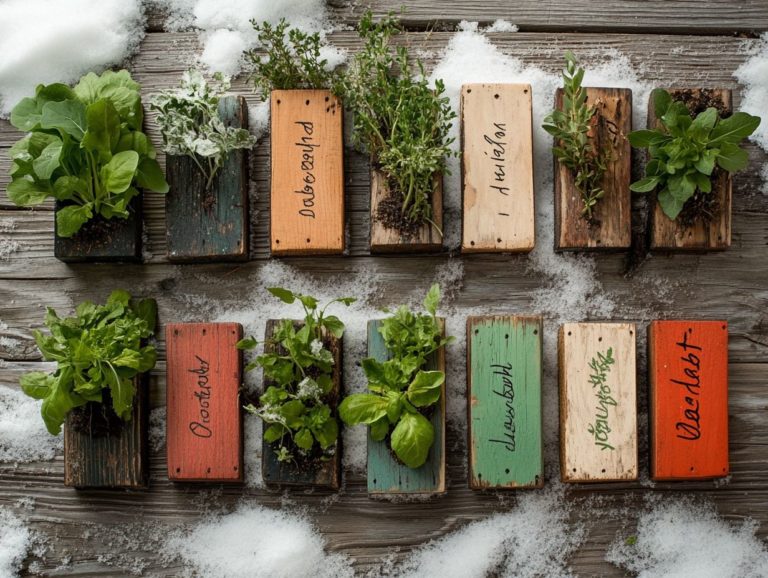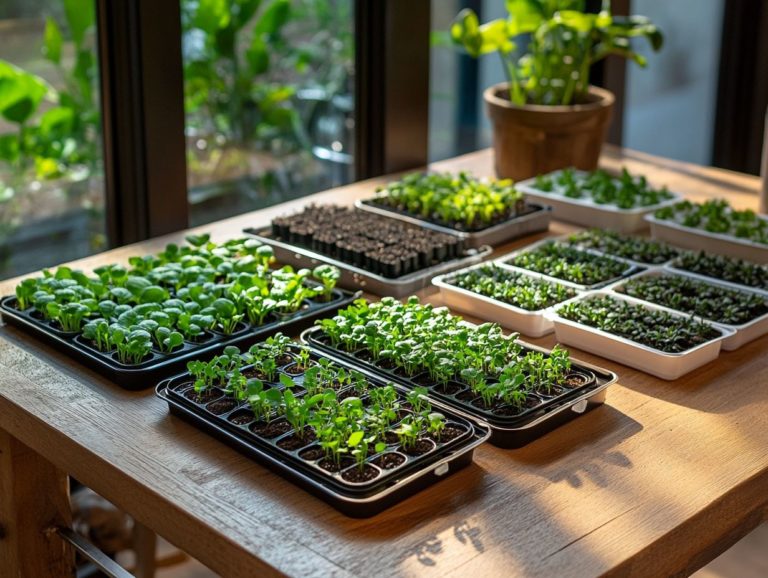How to Select the Right Soil Amendments
Healthy soil serves as the foundation for flourishing gardens and landscapes. It enhances soil health and fertility.
By understanding soil amendments, you can improve the structure, nutrient content, and ability to keep water in your soil. This guide breaks down the different types of soil amendments both organic and inorganic and helps you choose the right ones for your soil type and the specific needs of your plants.
You ll discover practical tips on how to apply these amendments effectively. This ensures your garden thrives and your plants receive essential nutrients. Whether you re a seasoned gardener or just starting out, this guide empowers you with the knowledge to improve your soil and boost your gardening experience.
Contents
- Key Takeaways:
- Understanding Soil Amendments
- Types of Soil Amendments
- Factors to Consider When Choosing Soil Amendments
- Common Soil Amendments and Their Uses
- How to Apply Soil Amendments
- Frequently Asked Questions
- What are soil amendments and why are they important?
- What factors should be considered when selecting soil amendments?
- What are some common types of soil amendments?
- How do I know which type of soil amendment to use?
- Can soil amendments harm your plants or the environment?
- How can I effectively apply soil amendments?
Key Takeaways:
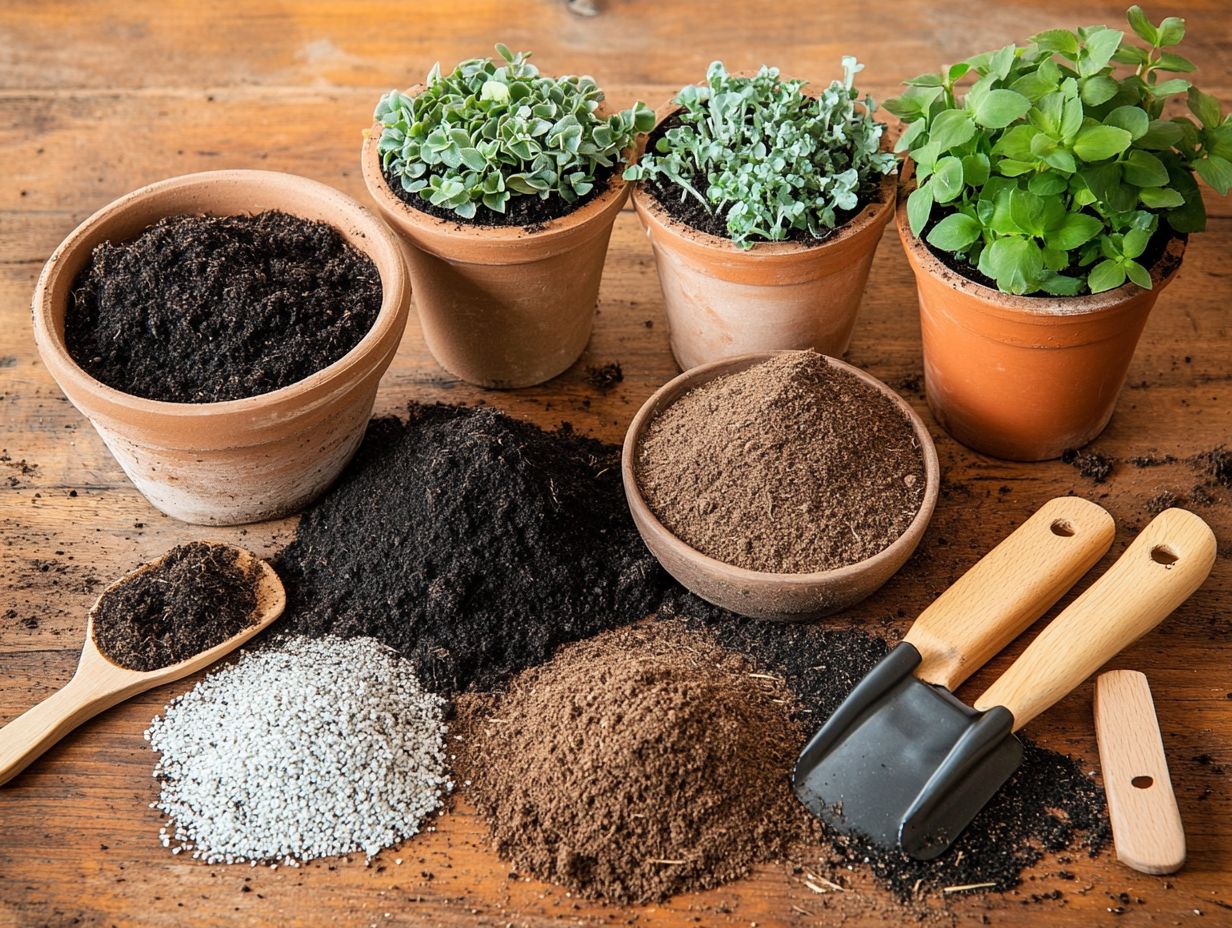
- Understand the purpose of soil amendments and how they improve soil quality.
- Consider factors like soil type, including clay and sandy soils, and plant nutrient needs when selecting the right amendments.
- Use techniques and timing that suit the specific type of amendment you re applying.
Understanding Soil Amendments
Soil amendments are vital for your garden. They help improve soil health and make it easier for plants to thrive by enhancing physical and chemical properties. These amendments play a key role in keeping water, improving nutrient availability, and creating a friendly environment for tiny living things in the soil that help plants grow.
Regardless of whether you’re dealing with clay soil, sandy soil, or any other type, knowing how different soil amendments work helps you create the best environment for your plants. This leads to flourishing ecosystems that support diverse life.
Definition and Purpose
Soil amendments are materials you add to your soil to improve its overall health and structure. They enhance water drainage and nutrient retention.
These amendments are essential tools for gardeners and farmers alike. They boost soil health by increasing organic matter and promoting microbial activity, which is vital for maintaining soil fertility. When you add substances like compost, peat moss, or mineral fertilizers, your soil experiences improved nutrient availability, making important minerals such as nitrogen, calcium, and potassium more accessible to plant roots.
These amendments create a balanced soil structure, which is important for root development and keeping water. By using soil amendments, you’ll cultivate stronger plants and enjoy better yields, transforming your garden beds and fields into flourishing ecosystems.
Types of Soil Amendments
Understanding the various types of soil amendments is essential for gardeners looking to boost soil fertility and health. These amendments can be broadly classified into organic and inorganic categories, each offering distinct benefits for improving soil quality.
Organic vs. Inorganic
Organic amendments, such as compost and manure, come from natural sources and are great for enhancing soil structure while providing essential nutrients. In contrast, inorganic amendments are made from synthetic materials that can quickly improve soil properties.
When you choose organic options like compost, you re not just feeding the soil; you re nurturing beneficial microbial activity. On the other hand, inorganic alternatives like synthetic fertilizers can deliver nutrients quickly. However, relying heavily on inorganic amendments might lead to long-term soil degradation, as they usually don t enhance soil structure or support a diverse ecosystem.
Take biochar, for instance this organic amendment not only traps carbon but also improves water retention, unlike some inorganic fertilizers that can cause runoff and pollution.
Grasping these dynamics is essential for effective soil management.
Start enhancing your soil today for a beautiful garden tomorrow!
Factors to Consider When Choosing Soil Amendments
Choosing the right soil amendments requires careful thought. Consider factors like soil type such as clay soil and sandy soil, the nutrient needs of your garden plants, insights from a soil test, and the current pH level. For detailed guidance, check out when and how to use soil amendments.
Each of these elements plays a vital role in the fertility and health of your soil.
Soil Type and Condition
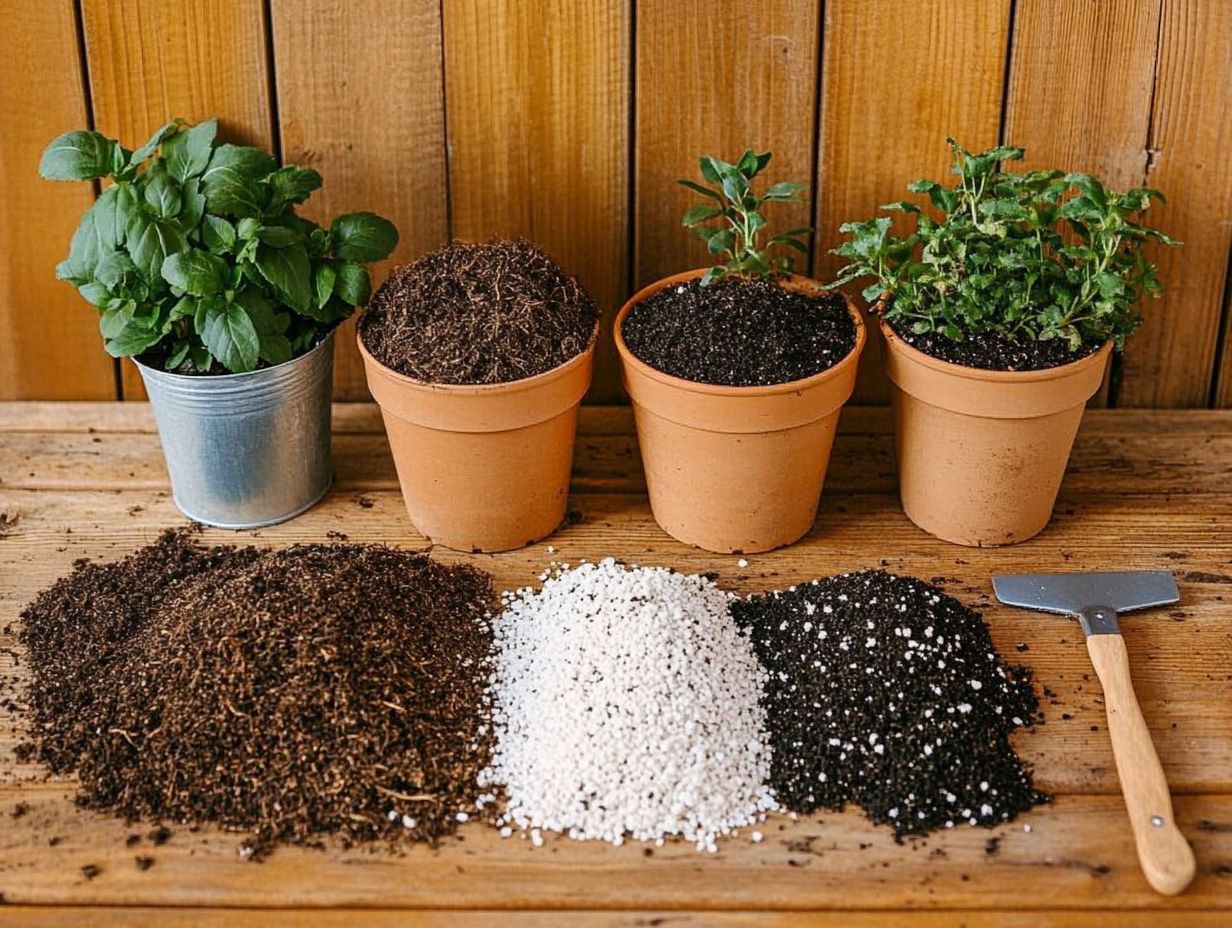
Understanding your soil type whether it’s clay or sandy soil is essential for selecting the right amendments to improve drainage and keep nutrients, ensuring healthy plant growth.
Each type of soil has unique characteristics that affect water flow and nutrient accessibility. For instance, clay soil holds water longer but often has poor drainage, which can lead to root rot. In contrast, sandy soil drains quickly but struggles to retain moisture and nutrients.
To improve these conditions, add organic matter like compost or well-rotted manure to sandy soils to boost nutrient availability. For clay soils, incorporating gypsum can break apart compacted particles, improving both drainage and aeration.
By understanding your garden’s specific soils, including pH levels (which indicate how acidic or alkaline your soil is) and nutrient deficiencies, you can make informed decisions that lead to healthier and more vibrant plant growth.
Plants and Their Nutrient Needs
Every garden plant has unique nutrient requirements for optimal growth. It s crucial to understand common nutrient deficiencies, especially related to nitrogen, calcium, and potassium.
Recognizing these variations allows you to tailor your soil amendments effectively. For instance, if you see yellowing leaves and stunted growth, you likely have a nitrogen deficiency, signaling the need for compost or nitrogen-rich fertilizer. If your tomatoes exhibit blossom end rot, a calcium shortage is likely, suggesting the application of lime or gypsum.
If you notice weakened stems or browning leaf edges, it indicates a potassium deficiency, requiring a potassium-rich layer to be added. By identifying these symptoms and adjusting your soil conditions, you can significantly improve your plants’ health and productivity.
Common Soil Amendments and Their Uses
Numerous excellent soil amendments can enhance your garden’s soil quality. Consider incorporating:
- Compost (including composted manure): enriches soil with nutrients.
- Manure: adds organic matter and nutrients.
- Peat moss: improves moisture retention.
- Perlite: enhances aeration and drainage.
- Vermiculite: aids in moisture retention and aeration.
Each amendment offers unique benefits that improve soil structure and fertility.
Compost
Compost is a fantastic soil amendment made from decomposed organic matter. It enriches your soil by adding essential nutrients and improving its structure while introducing beneficial microorganisms that support soil vitality.
This organic wonder promotes soil aeration, allowing roots to breathe and absorb water more effectively, crucial for healthy plant growth. It also helps retain moisture, creating a balanced environment that nurtures plant health during dry spells. The microorganisms in compost create a vibrant ecosystem that breaks down organic materials, steadily releasing nutrients.
You can create compost using various methods, such as:
- Traditional bins: a classic method for composting.
- Tumblers: for easy mixing and aeration.
- Vermicomposting with worms: a fun and effective way to create nutrient-rich compost.
Each method yields rich compost that s easy to apply to your gardens, ensuring your plants receive the best foundation for robust growth.
Manure
Manure is an exceptional natural soil enhancer, offering a rich tapestry of nutrients like nitrogen, calcium, and potassium elements that are crucial for robust plant growth.
Composted manure enriches the soil with essential nutrients. It also improves soil structure, facilitating better aeration and water retention.
In contrast, raw manure can be effective but requires careful management to prevent issues such as nutrient runoff, which occurs when essential nutrients wash away, potentially harming nearby water sources, and the presence of harmful bacteria or viruses that can affect plant health. You ll also encounter other types such as poultry, cow, and horse manure, each playing a specific role in enhancing soil fertility.
By incorporating these organic materials like leaf mold, straw, and composted manure into your gardening or farming practices, you can boost your soil s microbial activity today for healthier crops and better yields!
Peat Moss
Peat moss stands out as a premier soil amendment, celebrated for its remarkable moisture retention abilities. It is particularly effective in enhancing soil structure, especially in sandy soils, helping to improve soil fertility.
By integrating peat moss into your gardening endeavors, you can significantly boost the overall health and fertility of your soil. This organic wonder acts like a sponge, soaking up water and nutrients while simultaneously aerating the soil, a crucial factor for robust root development.
You ll often discover that combining peat moss with compost and other organic amendments yields optimal results, creating a balanced mix that nurtures a flourishing ecosystem. Its natural acidity further supports the growth of acid-loving plants, highlighting its versatility across various gardening applications.
Perlite
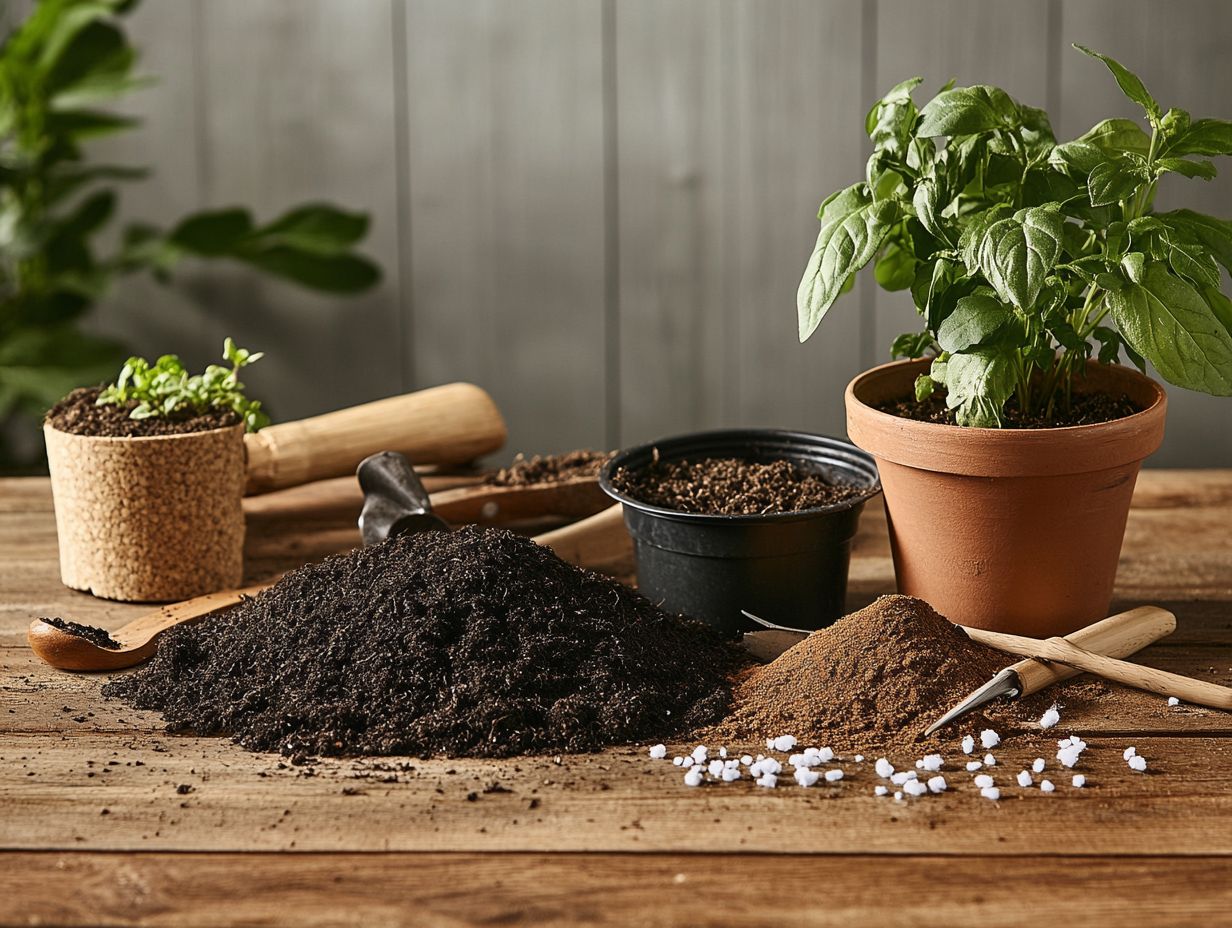
Perlite is a lightweight volcanic glass that serves as an exceptional soil amendment, enhancing soil aeration and drainage while also aiding in moisture retention.
Its unique structure forms tiny air pockets within the soil, effectively thwarting soil compaction a common dilemma that can impede the expansion of plant roots. This feature is especially advantageous in potting mixes, where space constraints often restrict root development.
By incorporating perlite into your garden beds, you not only improve drainage but also bolster the soil’s capacity to retain essential nutrients, thus enhancing nutrient retention and fostering an environment where plants can truly flourish. By striking the right balance of moisture and aeration, perlite plays a pivotal role in creating an optimal setting for a diverse array of plants, making it an essential asset for gardeners of all skill levels.
Vermiculite
Vermiculite is a remarkable mineral that can elevate your gardening game by improving soil aeration and moisture retention while delivering essential nutrients. It s a worthy addition to your potting mixes and garden soils.
This unique material, produced by heating specific volcanic minerals, transforms into lightweight, accordion-like particles that create ample air pockets within the soil. These pockets do wonders for your plants, promoting healthy root development by enhancing airflow and aiding in moisture retention ensuring your beloved greenery has access to the water it craves for optimal growth.
Whether you’re cultivating a vegetable patch, nurturing a flower bed, or tending to indoor container gardens, vermiculite’s versatility truly stands out. When blended with compost or other organic matter, it boosts nutrient availability, creating a richer growing environment that can lead to more robust plant health and bountiful yields.
Bone Meal
Bone meal is a slow-release organic fertilizer rich in phosphorus. It enhances soil health and supports strong root development.
This natural nutrient source fuels growth and improves soil structure. It also boosts microbial activity, resulting in healthier plants.
Apply bone meal during the planting season or as a top dressing in early spring. This ensures that nutrients are ready for your plants to absorb.
For the best results, mix it into the soil at a depth of 2 to 3 inches. If you re growing flowering plants or vegetables, adding bone meal can enhance blooming and fruiting.
This leads to better yield and quality, especially in clay or sandy soil.
Fish Emulsion
Fish emulsion is a liquid fertilizer made from fish waste. It provides essential nutrients and organic matter that enrich your soil.
This organic option is packed with nitrogen, phosphorus, and potassium key ingredients for strong plant growth. It delivers these nutrients quickly for immediate nourishment.
Fish emulsion also improves soil health by fostering beneficial microbes and enhancing soil structure. Apply it in early spring to kick off the growing season.
Dilute it with water and use it as a foliar spray or soil drench. This method allows it to penetrate the root zone easily.
How to Apply Soil Amendments
Applying soil amendments effectively means using the right techniques and timing. By mastering these, your garden plants will thrive.
Proper Techniques and Timing
Maximize the effectiveness of soil amendments with precise application techniques. Tailor them to your garden plants’ needs.
Mixing amendments into your existing soil ensures uniform nutrient distribution. This promotes healthier root development and plant vigor.
Incorporate organic compost into the soil before planting to enhance its structure and fertility. Apply surface amendments like mulch during the growing season for gradual nutrient delivery.
Know the best times for each type of amendment. For instance, add lime in early spring to balance soil pH, while nitrogen-rich fertilizers should align with your plants active growth periods.
Mastering these techniques will help you cultivate a thriving garden.
Frequently Asked Questions
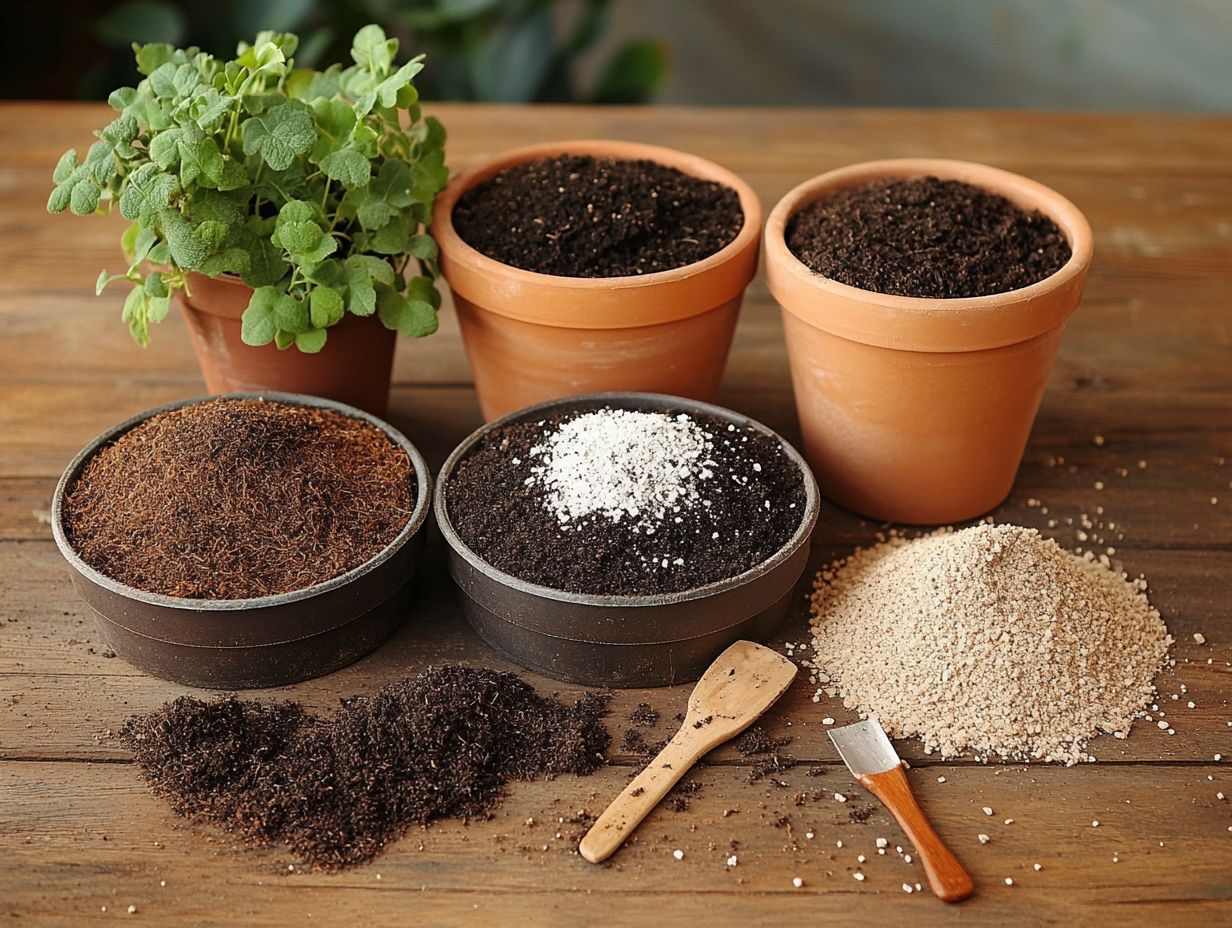
What are soil amendments and why are they important?
Soil amendments are materials added to soil to improve its properties. They create a better environment for plants and can increase crop yield.
What factors should be considered when selecting soil amendments?
Consider your soil type, the specific needs of your plants, nutrient deficiencies, and the long-term effects on the soil.
What are some common types of soil amendments?
Common types include compost, manure, vermicompost, peat moss, vermiculite, perlite, and various fertilizers.
How do I know which type of soil amendment to use?
The right amendment depends on your soil and plants’ needs. Conducting a soil test and consulting a gardening expert can help you choose the best option.
Can soil amendments harm your plants or the environment?
Some soil amendments can be harmful in high concentrations. Always follow recommended application rates to protect your plants and the environment.
How can I effectively apply soil amendments?
Application methods vary by amendment type. Some should be mixed into the soil, while others work better as a top dressing.
Follow the manufacturer’s application instructions for the best results.




